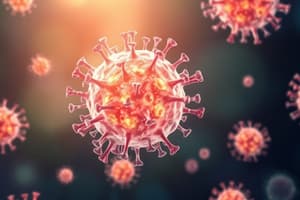Podcast
Questions and Answers
What is the primary characteristic of the secondary immune response?
What is the primary characteristic of the secondary immune response?
- It occurs after the first exposure to an antigen.
- The antibody response is immediate and at a higher level. (correct)
- The immune system does not remember previous antigen exposure.
- Antibody levels continue to rise indefinitely with repeated antigen exposure.
Which statement accurately describes the mechanism of the immune response?
Which statement accurately describes the mechanism of the immune response?
- It traps and processes antigens, reacts specifically to them, and produces antibodies or participates in cell-mediated immunity. (correct)
- It eliminates all foreign material from the body without any specificity.
- It produces antibodies in response to self-antigens, leading to autoimmune disorders.
- It has no mechanism for retaining memory of previous antigen exposure.
What is the role of immunological memory in the immune response?
What is the role of immunological memory in the immune response?
- It induces tolerance to self-antigens, preventing autoimmune disorders.
- It prevents the immune system from responding to the same antigen in the future.
- It allows the immune system to react more quickly and strongly to previously encountered antigens. (correct)
- It ensures that antibody levels continue to rise indefinitely with repeated antigen exposure.
What is the purpose of repeated injections of antigens in vaccination?
What is the purpose of repeated injections of antigens in vaccination?
What is the purpose of the regulation of antibody levels in the immune response?
What is the purpose of the regulation of antibody levels in the immune response?
What is the primary function of the innate immune system?
What is the primary function of the innate immune system?
What is the role of tolerance in the immune system?
What is the role of tolerance in the immune system?
Which statement accurately describes the adaptive immune response?
Which statement accurately describes the adaptive immune response?
What is the significance of the ability of the immune system to react specifically to an antigen?
What is the significance of the ability of the immune system to react specifically to an antigen?
What ancient civilization was noted to conduct the first attempts to induce immunity in the 15th century?
What ancient civilization was noted to conduct the first attempts to induce immunity in the 15th century?
Which of the following techniques was used in the 15th century to induce immunity by inserting dried crusts derived from smallpox pustules into small cuts in the skin?
Which of the following techniques was used in the 15th century to induce immunity by inserting dried crusts derived from smallpox pustules into small cuts in the skin?
In the 1754 control of rinderpest disease, what technique was used to make inoculated animals resistant to the disease?
In the 1754 control of rinderpest disease, what technique was used to make inoculated animals resistant to the disease?
What was the purpose of soaking a piece of string with nasal discharges from rinderpest positive cattle in the 1754 inoculation technique?
What was the purpose of soaking a piece of string with nasal discharges from rinderpest positive cattle in the 1754 inoculation technique?
What historical figure noted that only those who recovered from plague could nurse the sick without contracting the disease again?
What historical figure noted that only those who recovered from plague could nurse the sick without contracting the disease again?
Which of the following is NOT a form of immunity documented in the text?
Which of the following is NOT a form of immunity documented in the text?
What distinguishes the secondary immune response from the primary immune response?
What distinguishes the secondary immune response from the primary immune response?
Which of the following best describes the concept of anamnestic response in the immune system?
Which of the following best describes the concept of anamnestic response in the immune system?
How do antibodies produced during repeated injections of antigens differ from those produced early in the immune response?
How do antibodies produced during repeated injections of antigens differ from those produced early in the immune response?
What is the purpose of the immune system regulating antibody levels even after multiple doses of antigens?
What is the purpose of the immune system regulating antibody levels even after multiple doses of antigens?
Which characteristic best represents how cells retain memory in the context of the immune response?
Which characteristic best represents how cells retain memory in the context of the immune response?
What is a key feature of the secondary immune response's ability to remember previous exposure to an antigen?
What is a key feature of the secondary immune response's ability to remember previous exposure to an antigen?
What was the key observation that led to the development of vaccination?
What was the key observation that led to the development of vaccination?
Which of the following diseases did Louis Pasteur develop a vaccine for?
Which of the following diseases did Louis Pasteur develop a vaccine for?
What is the primary meaning of the term 'immunity'?
What is the primary meaning of the term 'immunity'?
Which of the following pathogens originate or live inside the body's own cells?
Which of the following pathogens originate or live inside the body's own cells?
What is the primary focus of the scientific study of immunology?
What is the primary focus of the scientific study of immunology?
What is the term used to describe the means by which pathogens attack or produce illness in the host?
What is the term used to describe the means by which pathogens attack or produce illness in the host?


